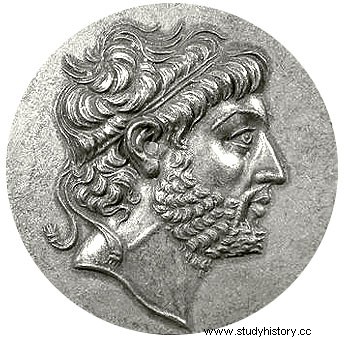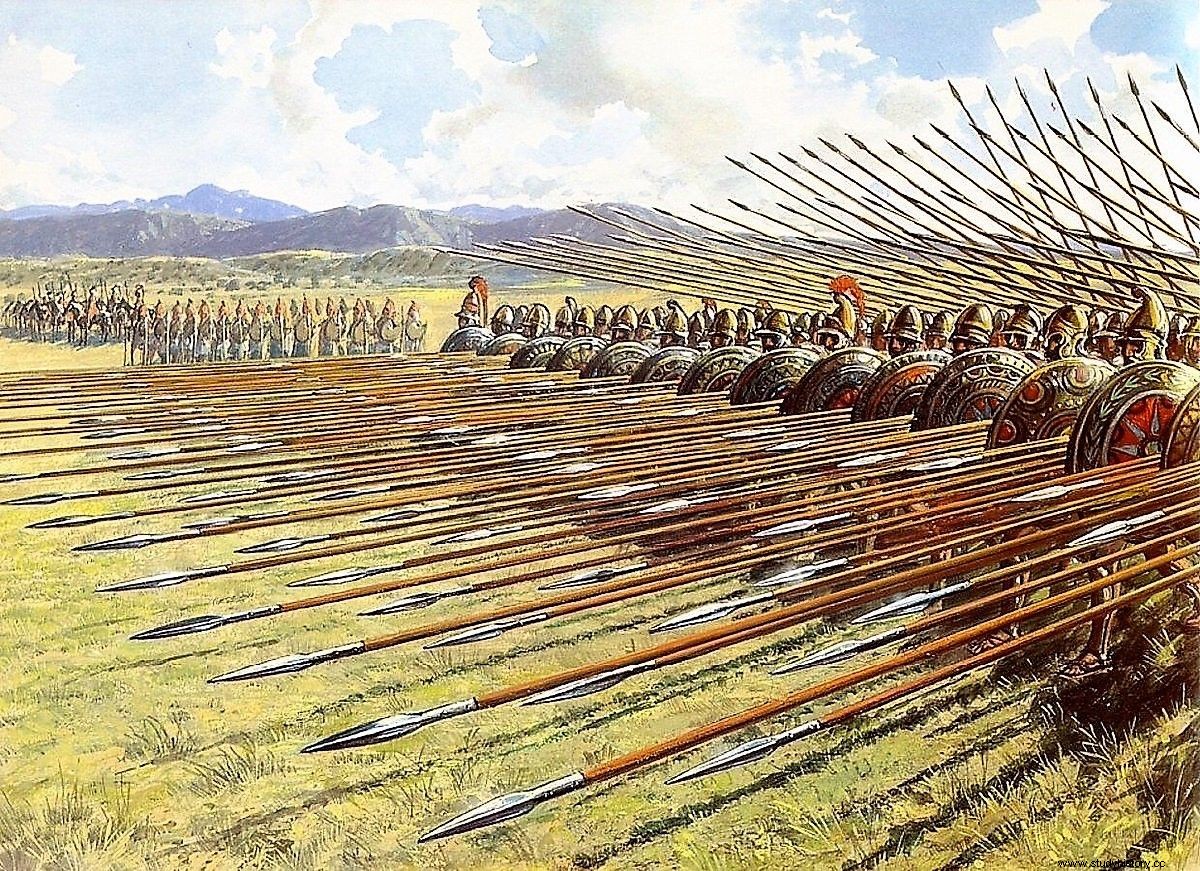Who would go down in history as Philip V of Macedonia born in 238 BC His father was Demetrius II, grandson of the legendary Demetrius Poliorcetes, one of the most prominent rulers of Antigonid Macedonia. When Philip was only nine years old, his father died, leaving his uncle Antigonus as regent of the kingdom. At the young age of seventeen, Philip inherited the kingdom from his uncle, thus becoming the youngest monarch of his day. According to the chronicles, he was a daring and handsome man, a warrior of proven bravery during the wars in Greece who inevitably came to be compared to the great Alexander.

Philip V
After actively participating in the Hellenic League conflict, his hegemonic aspirations made him look towards neighboring Rome and his possessions in Epirus and Illyria. In addition, it seemed the right time, because Hannibal was roaming freely in a devastated Italy, an ideal context to launch a series of offensives aimed at expanding through the eastern Adriatic without excessive resistance. He was wrong. His campaigns in Illyria were unsuccessful, losing his fleet in the attempt, save for the taking of the city of Lissus. Faced with so much misfortune, Philip thought it appropriate to sign a mutual support treaty with Rome's greatest enemy of all time, Hannibal Barca, who, after the disaster at Cannae, was then the owner and lord of southern Italy. This "axis of evil" for the Roman Republic was not in practice as lethal as its promoters intended, since the pincers that both leaders agreed on was neutralized shortly after when the Aetolian League declared itself a friend of Rome, bringing into play the insidious rival of Rome. Philip as paladin of the Hellenic world, Attalus of Pergamon. The confusion that prevailed in the eastern Mediterranean at that time, added to the high cost of the war for one and the other, made Philip and the Roman consuls on duty seek an agreed solution to the dispute. Thus ended the First Macedonian War, more like a truce than a peace.

Macedonian Phalanx
The fixation of Rome on Carthage, ready to compensate in Punic territory for the affront of Cannae, meant that Philip's pact with Antiochus III Megas did not attract much attention from the Senate, but after the crushing Roman victory over the Carthaginians at Zama, battle that hastened the end of the Second Punic War, the Roman Senate cast its shadow over Greece. Philip's pact with Antiochus, as well as the request for help from Rhodes and Pergamon, allies of Rome and enemies of Antiochus, provoked the declaration of the Second Macedonian War in 200 BC. After three years of campaigns without convincing success by anyone, the Macedonian phalanxes and the Roman legions commanded by the consul Tito Quincio Flamininus they met in the Cinoscephalos mountain range (Thessaly, Greece) With equal forces, except for the twenty elephants carried by Flamininus, both formations clashed with the balance of five thousand dead Macedonians and a thousand captives. The tactics of harassment and flight in the Iberian style, added to the charge of elephants that split the phalanx in two, ultimately meant the first defeat of the, to date, invincible and static phalanx against a more agile and more agile way of fighting. just as disciplined, the Roman legion .

The defeat of Cynoscephalus was a severe setback for the impetuous Philip; In addition to dismantling his fleet and paying Rome an indemnity of a thousand silver talents, he had to hand over his own son Demetrius as a hostage. . Since the overwhelming campaign of Flamininus, Philip behaved as an exemplary ally for Rome, helping her against Nabis of Sparta and his former partner Antiochus III, an action that earned him the forgiveness of part of the debt and the return of his son. . Macedonian cooperation was not enough for many of the more skeptical members of the Senate to give up their misgivings about Philip's veiled intentions. The king devoted his efforts to strengthening his power in the Balkans, an action that upset the neighborhood, especially Pergamon. The intrigue took over the Macedonian court. Perseus, Philip's second son and jealous of his older brother, instigated his father about Demetrius's intentions to agree with Rome on his abdication so that he would later be crowned as an allied dynasty of the Republic. That lie propagated by Perseus led his brother to the gallows in 180 BC
The order of execution of his own son irrevocably undermined the king's health, knowing in his last days the truth and the unjust death of his firstborn. Philip died in Amphipolis a year after those terrible events, perhaps saddened by being a witness and an accomplice in the death of his son... and that of his kingdom. Perseo was the last king of macedonia. A short time later, the consul Lucio Emilio Paulo defeated him at Pydna. The young Macedonian paraded through the streets of Rome as part of the spoils of the Third Macedonian War and ended his days two years later in seclusion in a villa in Alba Fucens. Thus ended the lineage of Antigonus the One-eyed, diadochus of the great Alexander, and the independence of the kingdom of the Sun of Vergina.
